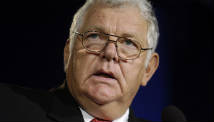From Michael Barone at NRO:
Indiana governor Mitch Daniels did not attract as large a crowd when he spoke at the American Enterprise Institute (where I am a resident fellow) earlier this week as he did several months ago, before he disappointed admirers by announcing that he wouldn’t run for president.
But Daniels’s message, based on his new book Keeping the Republic, was important — one that every presidential candidate should heed. It is about a looming issue, one that Barack Obama has so far decided to duck, but that one of them, if he is elected, may have to confront.
We face, Daniels said, “a survival-level threat to the America we have known.” The problem can be summed up as debt. The Obama Democrats have put us on the path to double the national debt as a percentage of gross domestic product, bringing it to levels that, aseconomists Kenneth Rogoff and Carmen Reinhart have written in This Time Is Different, have always proved unsustainable.
Daniels put it this way: Debt service will permanently stunt the growth of the economy. And that will be followed by a loss of leadership in the world, because “nobody follows a pauper.”
That growth in debt will continue to be driven by growth in programs labeled entitlements — though Daniels objects to that term. Congress, after all, can vote to cancel entitlement programs and deny promised benefits any time it wants, as the Supreme Court ruled in Flemming v. Nestor in 1960.
Daniels favors changes in Social Security and Medicare for tomorrow’s seniors that will give them choices and market incentives in buildingretirement income and seeking medical care. He insists that “average folks can make good consumerist decisions” and rejects the premise held by liberals from the New Deal to today that they can’t be trusted to navigate their way in our complex society.
This is quite a contrast with the Republicans out there running for president, who have had little to say about the problem of entitlements, in debates or in their platforms. Mitt Romney raises the problem but hesitates to advance solutions, and then attacks Rick Perry for making intemperate comments about Social Security in his book Fed Up!
On defense, Perry points out the success of public-employee pensionplans in three Texas counties that outperform Social Security. But these programs are impossible to scale up in a society where most employment is in the private sector, where most people will hold multiple jobs over their working lifetimes, and where many people move from state to state (often, as Perry points out, to Texas).
Daniels laments that the candidates “have not yet stepped out on these issues.” He says that he is “a little concerned that our nominee might decide, ‘I’ll just play it safe and get elected as the default option’” to an incumbent discredited by obvious policy failures.
“My question then is what matters — winning or establishing the base that enables you to make big gains?”
It’s a good question. When I worked as a campaign consultant, the candidates I admired most were those able to take hard stands on serious issues and make their positions work for them in the primary, in the general election, and then in governing. It sounds easy, but not many manage to do it.
Barack Obama sounded like such a candidate in 2008, and not just to his liberal admirers. He still tries to portray himself as the only adult in the room, the only one taking stands on principle and not for political gain.
But it’s increasingly obvious he is something more nearly the opposite. George W. Bush did campaign for Social Security reform in 2004, hoping for bipartisan support in a second term.
Obama is campaigning against “millionaires” and “corporate jets.” His “jobs program” includes higher taxes on job creators. He brushed aside his deficit commission’s recommendation for tax reform that eliminates preferences and lowers rates.
All this makes no sense as public policy and is dubious even as a campaign strategy. The question is whether the Republican candidates will dare to, in Daniels’s words, “speak grownup to citizens.”



